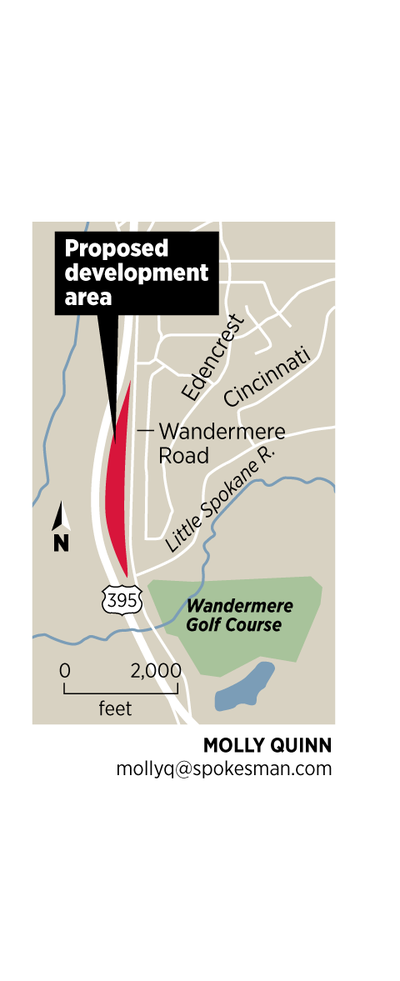Planning commissioners reconsider Mead apartment complex

County commissioners will reconsider a decision to deny parts of a controversial apartment complex from being built in the overcrowded Mead School District and near a neighborhood that vehemently opposes the development.
Five hundred residents in the Gleneden and surrounding neighborhoods north of Wandermere Golf Course signed a petition against the proposed three-story, 354-unit complex that would sit in an oddly shaped lot east of U.S. Highway 395. The opposition was so overwhelming the county’s planning commission took the rare step of throwing out a zoning change that would have paved the way for the complex’s construction in a 5-2 vote in October.
But the three-member board of county commissioners, prompted by Al French, voted unanimously last week to revisit the proposal at a public hearing Feb. 10. French said he wanted to make sure the planning commission’s actions followed state law governing growth management.
“I look at this, and I say, ‘This is a difficult situation,’ ” French said. The parcel in question is a 4.5-acre plot within a larger, 13-acre area already zoned for high-density residential development and slated for construction of 123 apartments later this year. The smaller piece within is categorized as low density, a classification that would make Rudeen Development’s plans for the full complex impossible.
Rudeen Development and its agent on the project, Kirk Kappen, donated a total of $1,000 to Al French’s recent re-election campaign. But French said the decision to hold another public hearing was not motivated by political contributions.
“That wouldn’t motivate me one way or another,” French said, adding he hasn’t made up his mind about whether to support the project, and the board routinely will call for additional public hearings to ensure planning decisions are following the law.
Joyce McNamee, the planning commissioner who raised concerns about the project’s effects on traffic, schools and the environment, said she feels the same as she did when she cast the vote to deny the application two months ago.
“I don’t agree with the county commissioners,” she said. “And I don’t have to.”
But her fellow planning commissioner, Pete Rayner, told the group in November that developers need to be able to rely on the county’s Comprehensive Plan when planning, and that rejecting the zoning change would cast doubt on the regulations.
Several residents raised concerns about the removal of trees on the property, which act as a natural buffer between homes and the highway as well as prevent stormwater from running off into the Little Spokane River. Rudeen has submitted a proposal that would keep tree removal to a minimum and would put 208 grass swales on the property to retain stormwater.
Commissioner Todd Mielke, who represents the district where the development is proposed, said he didn’t think the planning commission’s rejection of the project was as emphatic as the vote suggested, citing comments from planning commissioners about voting along with the large crowd in attendance. He also said the standard for the approval of a zoning change should be the law, not public opinion.
“I’m not sure that this one went through all the due diligence that’s required,” Mielke said.
Resident Claudia Fiola said she was disheartened by the response of county officials to the neighborhood’s complaints.
“They act like we’re not there,” Fiola said. “They’re not listening.”
Mielke also did not say whether he has decided to vote in favor of the development, but he was sure of one thing: “I guarantee we will get an appeal on this project.
“When we get appealed, we have to stand in front of a court and show them which part of the law we were following when we made this decision,” he said.
Among those who likely would appeal a decision allowing the project to move forward are Karl and Gail Schmid, who have lived in the nearby Gleneden neighborhood for 41 years. The Schmids said they were informed of the plan to develop the 4.5 acres by mail, and only then because they live within 400 feet of the property boundary. Many of their neighbors didn’t receive notices at all, they said.
Karl Schmid cited traffic concerns as one of the reasons he’s opposing the project. Engineers estimate the complex would add close to 200 cars to Wandermere Road during rush hour, congestion Karl Schmid thinks would make the roadway impassable.
“It’s going to be hell,” he said. “I don’t know how we’re going to get across.”
Adding a stoplight would make little sense, he said, because of the steep incline of the road. Slowing cars down going up the hill in the winter would be a nightmare, he said.
Gail Schmid worried about the effect on the Mead School District, which already is experiencing overcrowding at some schools. Ned Wendle, facilities and planning director for the district, did not return a call requesting comment, but testified in November that building the complex would require some changes to accommodate students attending the nearby Northwood Middle and Farwell Elementary schools. The proposal also comes as Mead is pushing for a school bond on February’s ballot.
“Yes, the school can make room,” Gail Schmid said. “But is that advantageous to the student or the community?”
Another resident, Jennifer Mudge, has been assisting the effort to inform neighbors of the coming public meetings. Mudge said the commissioners’ decision to reconsider the application was frustrating but may turn out to be a blessing.
“There’s so much neighborhood interest in this thing,” she said. “It could be a good thing so that more voices will be heard.”